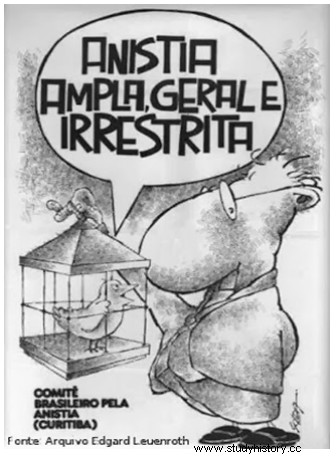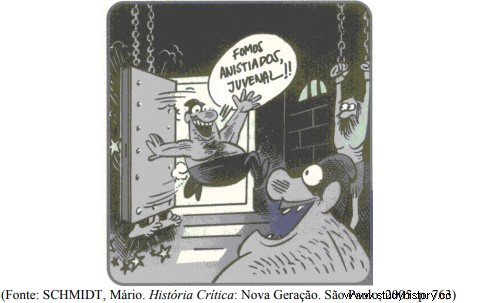
Available at
Regarding the enactment of the Amnesty Law, in 1979, we can conclude that:
(A) it was the result of negotiations involving social movements that, at that time, identified the slow, gradual and safe process of distension as positive.
/>(B) limited accountability for crimes of a political nature only to those who had a final and unappealable process and disregarding the violent action of the State.
(C) marked the transition to the democratic regime, allowing the return of exiles, however, it made it impossible to punish those who carried out the regime of exception.
(D) indiscriminate amnesty constitutes an integral norm of the Brazilian judicial system, conferring a character of legitimacy to the action of the State and national conciliation.
Question 02 - VUNESP - 2013 - FUNDUNESP - Historiographer - Law No. 6,683, of August 28, 1979, granted amnesty to all those who, in the period between September 2, 1961 and August 15, 1979, committed political crimes or those connected with them, electoral crimes and those who had their political rights suspended (...). For the purposes of this law, crimes of any nature related to (A) crimes committed for political reasons were considered connected. (B) robberies followed by murder. (C) bank and armored car robberies. (D) invasion of private or state property. (E) crimes committed against the national heritage.
Question 03 - NC-UFPR - 2019 - City Hall of Curitiba - PR - According to Boris Fausto, from 1974 onwards “the Geisel government is associated with the beginning of the political opening that the president general defined as slow, gradual and safe” (FAUSTO, Bóris. História do Brasil. 6. ed. São Paulo:EDUSP:FDE, 1999, p. 489).
Regarding this process of opening and democratic transition, known as distension, mark the correct alternative.
a) It had the support and adhesion of soldiers from different currents of thought, including those known as hardliners.
b) Since the beginning of the process, populist unionism has been strongly rebuilt.
c) The amnesty law was characterized by making concessions to those responsible for of torture, but also made it possible for political exiles to return to the country.
d) The Diretas Já campaign led to the approval of the Dante de Oliveira Amendment, guaranteeing direct elections for president in 1985.
e) In government José Sarney there was an important rupture with the military period, with the extinction of the Serv National Information Office (SNI).
Question 04 - VUNESP - 2013 - FUNDUNESP - Historiographer - The Amnesty Law, as Law No. 6,683, of August 28, 1979 became known, suffered much criticism after being sanctioned by President João Batista Figueiredo because (A) the text of the Law, approved by Congress and sanctioned by the President Figueiredo, was prepared by the Brazilian Committee for Amnesty, created in 1978 by ARENA – Aliança Renovadora Nacional. (B) the government bill met only part of the national appeal, because it included those convicted of terrorism and favored the military, including those responsible for the practices of torture. (C) Law No. 6,683, approved by Congress, granted amnesty to all citizens punished for acts of exception since April 9, 1964, the date of issue of AI-1, benefiting students, professors and scientists away from their institutions of origin , and immediately reusing civil and military employees. (D) granted to military personnel and public servants, who had a direct or indirect participation in the acts practiced by the military regime, the same amnesty granted to journalists, left-wing politicians, artists and other citizens who were imprisoned or exiled by the military regime. (E) until 1985 he kept in state custody about 50 political prisoners, whose cases were jointly analyzed by the Superior Military Court.
Question 05 - FMP/Petrópolis (Medicine) 2016 - Amnesty Law (1979)
“Art. 1 Amnesty is granted to all those who, in the period between September 2, 1961 and August 15, 1979, committed political crimes or crimes related to them, electoral crimes, to those who had their political rights suspended and to the employees of the Direct and Indirect Administration. , of foundations linked to the public power, to the servants of the Legislative and Judiciary Powers, to the Military and to the union leaders and representatives, punished on the basis of Institutional and Complementary Acts. (…)
Paragraph 2 – Those convicted of crimes of terrorism, assault, kidnapping and personal attack are excluded from the amnesty benefits.”
BRAZIL. Law No. 6,683, of August 28, 1979. Grants amnesty and other measures. Brasília, DF, 1979. Available at:
The Amnesty Law was enacted by the federal government in 1979, after a national campaign that brought together various social groups and civil society institutions organized around the “Broad, General and Unrestricted” Amnesty banner. However, the interpretation of the parts of the law reproduced above, in line with the understanding of the Judiciary, shows that the amnesty was restricted, among other reasons, because
Question 06 - ENEM 2014 - 3rd Application -
TEXT I
The amnesty can be considered much more a concession than a conquest or, more precisely, a political maneuver with two purposes:to reduce the pressure coming from organized sectors against the regime; and to produce substantive defenses to possible revisions of the past with the expected end of authoritarianism.
SOARES, S. A.; PRADO, L. B. B. The political process of amnesty and the spaces of military autonomy. In:SANTOS, C. M.; TELES, E.; TELES, J. A. Unfiling the dictatorship:memory and justice in Brazil. São Paulo:Hucitec, 2009 (adapted).
TEXT II
The amnesty was an achievement. It wasn't a gift, it was a fight. You don't have to review it.
Interview with Therezinha by Godoy Zerbini. Available at:www1.folha.uol.com.br. Accessed on:1 Aug. 2012 (fragment).
The Amnesty Law, approved by the National Congress on August 28, 1979, has been debated by Brazilian society. In the texts, the positions taken reveal
A) resumption of the military dictatorship in the name of national unity.
B) appreciation of movements linked to the armed struggle from the opening of the archives.
C) relativization of human rights based on the Brazilian dictatorial experience.
D) rewriting the history of leftist terrorism to understand the past.
E) critical reflection on the past due to changes in the political scenario.
Question 07 - UNIMONTES 2013/1 -

The cartoon above is a criticism of the Amnesty Law, because it forgave A) the subversives and terrorists who started the protest movements in Vale do Ribeira, which destabilized the regime. B) to the ARENA federal deputies for always voting against government projects and for organizing rallies and marches in favor of prisoners. C) American agents who fought against leftist movements, trade unionists and intellectuals who opposed the 1964 coup. D) torturers and those tortured, without the former having suffered any physical constraint or been judged after their actions.
INTRODUCTION
01- C
02 - A
03 - C
04 - D
05 - C
06 - E07 - D
